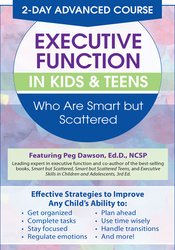

Make good choices. Study. Take turns. Start homework. Sit still. Focus. Finish homework. Turn in homework.
Executive function (EF) is at the core of everything kids and teens are asked to do each day at home and school. And yet when these expectations aren’t met, professionals often turn to consequences, discipline, and “tough love” to encourage change. And when that doesn’t work, the child is labelled as “lazy” or “unmotivated” rather than someone who lacks certain skills.
Watch Peg Dawson, Ed.D., NCSP, leading expert in executive function, for this advanced training where you’ll not only gain a comprehensive understanding of executive dysfunction and its impact on young lives, you’ll also have a complete clinical toolbox full of interventions to:
And while many intervention plans are too complicated and time-intensive for long term success, Peg offers up simple, straightforward, and practical interventions that can be used every day to improve any child or teen’s level of functioning.
This recorded training is a must-watch for any professional working with kids and adolescents – buy today!
This online program is worth 12.75 hours CPD.
| File type | File name | Number of pages | |
|---|---|---|---|
| Manual - Executive Function in Kids & Teens (1.97 MB) | 76 Pages | Available after Purchase | |
| Additional Handout - Executive Functions (0.44 MB) | 21 Pages | Available after Purchase | |
| Instructions for ASHA credit - Self Study (64.4 KB) | Available after Purchase | ||
| Additional Handout - Executive Functions - French (451 KB) | 21 Pages | Available after Purchase | |
| Manual - Executive Function in Kids & Teens - French (1.97 MB) | 76 Pages | Available after Purchase | |
| Additional Handout - Executive Functions - Italian (451 KB) | 21 Pages | Available after Purchase | |
| Manual - Executive Function in Kids & Teens - Italian (1.97 MB) | 76 Pages | Available after Purchase |

Peg Dawson, EdD, NCSP, is a school psychologist and for over 20 years has worked at the Center for Learning and Attention Disorders in Portsmouth, New Hampshire, where she specializes in the assessment of children and adults with learning and attention disorders. She is co-author of the bestselling books on executive dysfunction, Executive Skills in Children and Adolescents: 2nd Edition (Guilford, 2010), Smart but Scattered (Guilford, 2009) and Smart but Scattered Teens (Guilford, 2013).
Peg is a past editor of Communiqué, the newsletter of the National Association of School Psychologists, and has published numerous articles and book chapters on a variety of topics, including retention, ability grouping, reading disorders, attention disorders, the sleep problems of adolescents, the use of interviews in the assessment process, and homework.
Peg has many years of organizational experience at the state, national and international levels and served in many capacities, including president of the New Hampshire Association of School Psychologists, the National Association of School Psychologists (NASP) and the International School Psychology Association.She has also participated in many of NASP’s leadership initiatives, including the Futures Conference and the development of both the second and third Blueprint for the Training and Practice of School Psychology. She is the 2006 recipient of NASP’s Lifetime Achievement Award. Peg received her doctorate in school/child clinical psychology from the University of Virginia.
Speaker Disclosures:
Financial: Margaret (Peg) Dawson is an author for Guilford Press and receives royalties. She is an author for Amacon publishers and receives royalties. She receives a speaking honorarium from PESI, Inc.
Non-financial: Margaret (Peg) Dawson has no relevant non-financial relationships.
Get to Know Executive Function (EF)
The Neurobiology of EF
Assessment: What Does Weak EF Look Like?
Linking Assessment to Intervention: 3 Key Skills to Accommodate Executive Skill Weaknesses
STRATEGIES, STRATEGIES, STRATEGIES: Must-Have Interventions for Home, School & Beyond
Student-Centered Interventions: Steps and Guidelines
Practical, Innovative Strategies Designed to Target:
Coaching: 1:1 Interventions for Executive Skill Development
Clinical Considerations
Satisfaction Guarantee
Your satisfaction is our goal and our guarantee. Concerns should be addressed to info@pesi.co.uk or call 01235847393.
Please wait ...